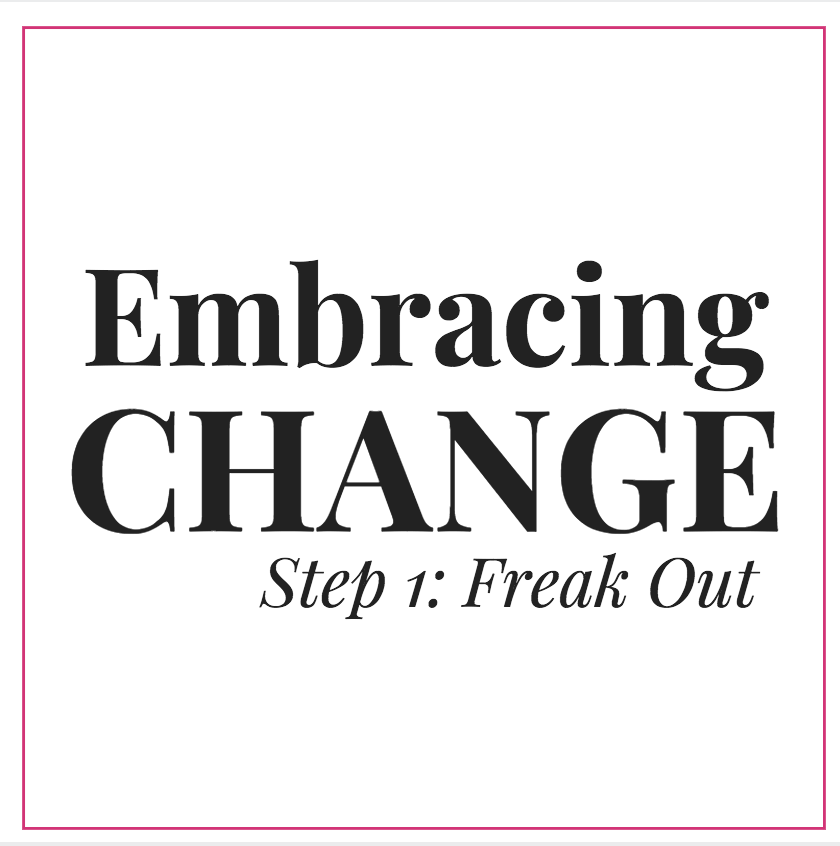Handling change is a critical skill for anyone. If you're alive, you're handling change all the time. And if you want to accomplish big dreams, you're signing up for more change than average. But some life circumstances throw change at us faster than others. How we deal with it can be the difference between freaking out and settling in.
When I returned to the workforce (and started working with other humans in close quarters toward common goals), I resumed the practice of some skills and cultivated other skills in new ways.
In addition to attending meetings and being held accountable for revenue and expenses, I also helped several people grow fulfilling, meaningful careers. One of these strong women I worked with asked me (regarding her performance and our team's changing focus), "How have you dealt with all the changes?"
I worked in an extremely fast-paced web-based environment where technology and market forces can conspire overnight to change fundamentals in our business. Our company culture is moving with the changes. It's what we do. But my colleague’s question caught me off guard. I can't remember what I said at the time, and I wasn't satisfied with my answer.
How do I deal with change?
The truth is I have no idea. Because I don't know any other way but change.
And this is how I deal with it.
Step 1: Freak Out
When I was a bank teller in college, one of my managers used an easy phrase to disarm us in any panic situation. When we'd go to her in a tizzy over a cranky customer or a miss-keyed deposit, desperate to know:
What should I do?
She'd always return our super-stressed expression and respond the same way:
Just freak out.
Then she'd smile and help us through the challenge at hand. I'm so grateful she taught me it's okay to freak out. For a minute. Then it's time to move on.
During a two month period in 2013...
I went back to work full time
My husband changed jobs after 13 years at the same company
My daughter switched from her big public school to a small charter
And we moved to a new house (before selling the old house)
It was all very exciting and terrifying. But it was also just the way of my world.
My first job out of college was in consulting. Nothing static about switching projects, managers, and clients every 6-12 weeks. Then, I had two babies and moved over to the tax department. Big city tax work was very dynamic. Then my husband’s career took us from Seattle to Middle America. The small regional firm’s tax department was not so dynamic. So I left. Because I craved change. Next, came years of freelance writing, editing, publishing, speaking, content strategy, and social marketing consulting. Never the same day twice.
Still, all those changes within 2 months during 2013 had me spinning. I didn't handle it all very well. I freaked out. For a minute. I got overwhelmed. I cried. I felt sorry for myself.
It's okay to freak out, so long as move on quickly.
Step 2: Relax and make a [new] plan
I've been obsessed with that question about how to deal with change because I'm a sucker for systems. I LOVE my routines. It's Sunday as I write this.
I stocked the refrigerator and pantry. I know more or less what our family will eat for dinner every day this week. I have 5 outfits hanging in my closet that I don't have to think about (thank you, capsule wardrobe). And I've walked my dog and hit my yoga mat today.
All because it's part of my routine.
I live by these routines. But I also live to change them. (That's a huge part of my love for Arkansas, by the way, the fact that there are distinct seasons here, natural delineations for changes in routine.
The only thing I love more than a routine is a new routine. The only thing better than a great spreadsheet is a new great spreadsheet. But for me, when things are influx, my need for order asserts itself. No sooner has change descended than I have a 7-point plan. And maybe a flowchart. The new plan might not work for long. But that's okay, because we'll need a new one soon anyway.
Step 3: Let go and repeat
Here's the trick... Make the plans. And map the process. But don't get too attached.
Because you know what they say about our puny human plans. God thinks they're funny.
Embrace routines. Court stability. Yes, of course. But when change comes along, take a deep breath -- and make a new spreadsheet.
Do you need help defining the change you need to embrace? I can help.



